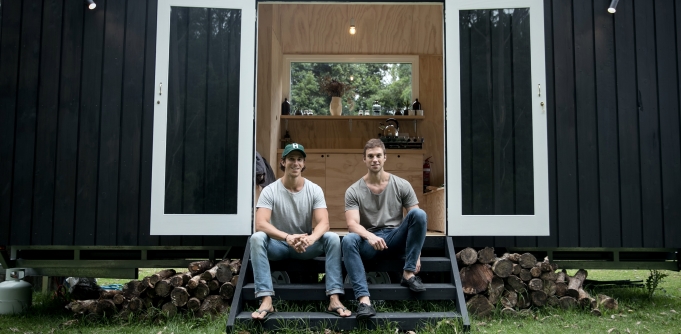
Chris and Cam Grant, Unyoked founders. Source: Supplied.
A pair of Aussie twins are pioneering the concept of “wilderness on demand”, inviting stressed office workers to get out of the city and experience the bush through their new accommodation startup Unyoked.
Chris and Cam Grant tell SmartCompany they came up with the idea for Unyoked a few years ago after realising their respective inner-city jobs were “spreadsheeting us to death”.
“I was working at Commbank and Chris was at General Assembly, and we began to realise we were seeing all our free time disappear. You’d have one trip overseas a year, which was great, but once you came back it’d be 11 months until the next one,” Cam says.
“Instead of just staring down that time sitting at your desk, we wanted to create a way to have the benefits of a holiday experience on a day-to-day, week-to-week basis.”
It was here the idea for Unyoked was born. With the company name literally meaning ‘to cease work’, the two concocted a plan to insert tiny cabins on rural properties a few hours out of the city, and rent them out of a night-by-night basis.
These cabins bring “all the escapism of camping with all the amenities of a small hotel” says Chris, but those amenities stop short of providing wifi, with the goal of Unyoked being to help people disconnect.
“It’s about reconnecting with stuff that matters, all within two podcasts’ distance of the city,” Chris says.
The two have seen an interesting mix of customers also, with around 30% being solo stayers and the other 70% being couples. Much of the mid-week bookings are solo, with the founders believing many people are using the nights away to spend time solving difficult work problems.
Capital constraints
A big part of Unyoked’s success hinges on the landowners themselves, with the company working with the owners of privately-owned land within a few hours of the city, who host and maintain the cabins while taking a cut of the earned revenue.
“With the sharing economy in full swing, we realised there’s a lot of people with resources to share who might want to make some extra money,” Cam says.
The founders have a significant backlog of interested landowners across Sydney and Melbourne, and an even bigger backlog of interested customers. The two are currently raising capital to help them scale the business and open more cabins, which cost around $35,000 to build.
One investor is co-founder of Luxury Escapes Adam Schwab, who joins a “good mix” of high net-worth individuals, angel investors and private equity investors currently contributing to a $2 million round.
“We’d already found product-market fit, we have a waitlist of over 5,000 people, the only constraint has been capital,” Chris says.
“It’s really exciting to get this support from these intelligent minds, but financing can be a grind. It takes you away from your business, which neither of us wanted to do.”
Tiny, tiny houses
The two are planning to open an additional 20 cabins over the next year, and say they’re constantly engaging in R&D to improve the sustainable technology built into the dwellings.
Unyoked is also partially capitalising on the growing ‘tiny house’ trend, with young people looking towards smaller, sustainable homes due to an increasingly competitive housing market.

Chris and Cam say their buildings are tiny houses, but prefer to use the term ‘cabin’, as tiny house tends to imply a sense of permanency while their cabins are designed to “facilitate an experience”.
Right now the founders are focused on hiring and growing out the business to cope with the overwhelming demand, along with looking at other options such as family cabins.
“We started Unyoked with the idea of wilderness on demand to help people get down on a moment’s notice, but that’s not much use if we’re booked out seven nights a week,” Cam laughs.
NOW READ: The dark side of online travel booking: Fed up small businesses call for ACCC action


COMMENTS
SmartCompany is committed to hosting lively discussions. Help us keep the conversation useful, interesting and welcoming. We aim to publish comments quickly in the interest of promoting robust conversation, but we’re a small team and we deploy filters to protect against legal risk. Occasionally your comment may be held up while it is being reviewed, but we’re working as fast as we can to keep the conversation rolling.
The SmartCompany comment section is members-only content. Please subscribe to leave a comment.
The SmartCompany comment section is members-only content. Please login to leave a comment.